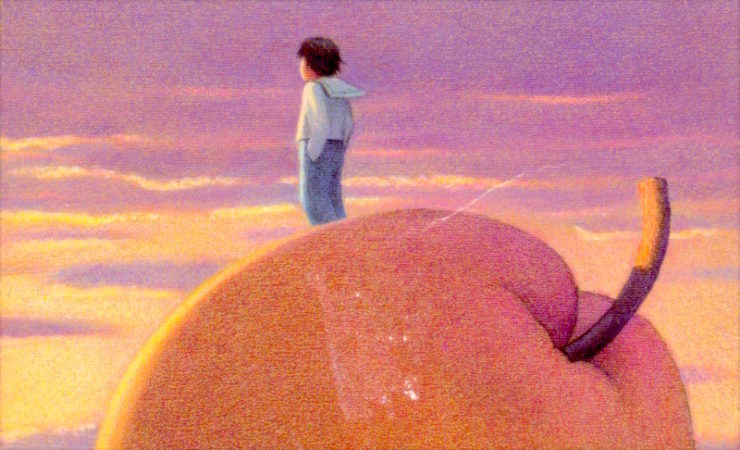A book can stay with you forever, and receiving a book unasked that shapes your life so significantly can feel particularly fateful.
Below, some of the Tor.com staff reveal books that they’ve received which have gone on to shape their lives. What will you unwrap this year, and what paths will it lead you down?
The Sparrow by Mary Doria Russell
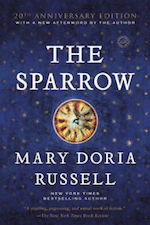 The Sparrow was one of the last books I received as a gift, before I began working in publishing and my loved ones assumed that I would want for neither books nor recommendations ever again. Maybe that’s part of why I remember so precisely picking it up under the Christmas tree in my childhood home, or my initial trepidation when my mother mentioned that her book club had read it. I doubted not her taste, but the taste of a group of moms who spent more time gossiping and drinking wine than analyzing the books—still fun, but I was surprised to hear that they had picked up a sci-fi novel from the ’90s.
The Sparrow was one of the last books I received as a gift, before I began working in publishing and my loved ones assumed that I would want for neither books nor recommendations ever again. Maybe that’s part of why I remember so precisely picking it up under the Christmas tree in my childhood home, or my initial trepidation when my mother mentioned that her book club had read it. I doubted not her taste, but the taste of a group of moms who spent more time gossiping and drinking wine than analyzing the books—still fun, but I was surprised to hear that they had picked up a sci-fi novel from the ’90s.
That early-20s snobbishness kept me from reading The Sparrow for about six months, but I’ve since read the book at least four times—both cover to cover and a selection at a reading series a few years back. I revisited it this year, the 20th anniversary, to discuss it in conversation with Arrival about how human/alien gift-giving can be disastrous. One of the passages will be a reading at my wedding. It’s one of those rare books that has everything: naturalistic characters who contain multitudes; an easy way in to space travel and time dilation for the less scientifically-minded like myself; humor, pathos, the ache of unrequited love and devastating horror in ways that don’t feel contrived. I get something different from it every time I read.
The biggest impact that The Sparrow has had on me is that it’s the book I most often recommend. It was one of the first pieces of media I pressed upon my partner in the first few months of dating, and it was his father’s first impression of me (which, considering that the man is very religious and the book has a very anti-faith ending, had me worried). But both parties loved it, and it’s become a frequent conversation topic that’s led us to share subsequent books: Ancillary Justice, The Three-Body Problem, The Left Hand of Darkness. —Natalie
James and the Giant Peach by Roald Dahl
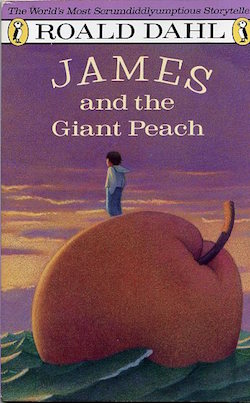 I have been given so many important books for Christmas over the years (Chronicles of Narnia, Harry Potter, The Hobbit), but this one sticks out in my memory because it was my first Roald Dahl book, and the person who gave it to me—my aunt—got to read a good portion of it to me while she was visiting us. (I think I was seven. That sounds about right. I remember the apartment we were living in at the time, but my age is fuzzy—isn’t that always the way?) She did the greatest voices for all the characters, but particularly for Mr. Grasshopper, who was far and away my favorite.
I have been given so many important books for Christmas over the years (Chronicles of Narnia, Harry Potter, The Hobbit), but this one sticks out in my memory because it was my first Roald Dahl book, and the person who gave it to me—my aunt—got to read a good portion of it to me while she was visiting us. (I think I was seven. That sounds about right. I remember the apartment we were living in at the time, but my age is fuzzy—isn’t that always the way?) She did the greatest voices for all the characters, but particularly for Mr. Grasshopper, who was far and away my favorite.
The cover to the right was the cover that I had, for sure. And while I wasn’t a complete alien to Dahl’s sensibilities—I watched Willy Wonka and the Chocolate Factory on repeat from a very early age—there is something about encountering Dahl’s prose for the first time that really makes its mark on a kid. The journeys are harrowing, the characters bombastic, but you never really question if anything that occurs in his stories are possible. Not because kids have wild imaginations and whatnot, but more because… you’re pretty sure that what happens in Roald Dahl books has already happened to you somehow. His stories feel an awful lot like dreaming.—Emily
The More Than Complete Hitchhiker’s Guide by Douglas Adams
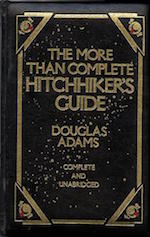 By the time I was in middle school, I was a pretty solid fantasy reader. I read The Lord of the Rings every year—my own pilgrimage to Mordor and out again—and spent all my birthday and Christmas Waldenbooks gift certificates on the fattest fantasy novels I could find. I read everything on my mom’s shelves that had an intriguing cover (Kathleen Sky’s Witchdame!) or a feisty, troubled young heroine (Jo Clayton’s Duel of Sorcery series!).
By the time I was in middle school, I was a pretty solid fantasy reader. I read The Lord of the Rings every year—my own pilgrimage to Mordor and out again—and spent all my birthday and Christmas Waldenbooks gift certificates on the fattest fantasy novels I could find. I read everything on my mom’s shelves that had an intriguing cover (Kathleen Sky’s Witchdame!) or a feisty, troubled young heroine (Jo Clayton’s Duel of Sorcery series!).
But I rarely picked out anything funny.
When my uncle sent me the leather-bound, gilt-edged More Than Complete Hitchhiker’s Guide, it wasn’t the first funny book he’d sent. (I read a lot of Xanth books. I’m not ashamed.) But it was funny science fiction, not fantasy. It took a while for me to commit to reading the whole thing, but I did, and my ideas about stories, about the way the galaxy might look, just bloomed. I’m a very visual reader; there are movies in my head that play whenever I think about a story I’ve read. And these movies looked different than anything I’d dreamt up before. People had fun in these stories. Adams’s sense of the absurd felt so familiar to me that it made the entire universe seem … accessible. And like a thing you could also laugh at, maybe. (Halfway through the book, I realized I’d heard my mother and stepfather listening to the radio production of Hitchhiker, years before. Once you’ve met Marvin, you don’t forget him.)
It’s hard to explain Adams to people who haven’t read him, to explain that you can laugh your face off and also feel like you’re reading some impossible truth about life (the universe, and everything). Adams informs my sense of humor, my references, my ideas about the world(s), in a way that’s somehow more down-to-earth than all the epic fantasy I adore. When I was a kid, those books felt like dreams of living in a different world. Hitchhiker felt like it might know something about being a grownup, here, on a mostly harmless planet. —Molly
Great American Novel Map, by Hog Island Press
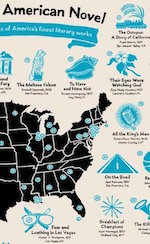 All right, this technically isn’t a book, but hear me out. The Great American Novel Map is exactly what it sounds like: a map of the settings of books that the good people of Hog Island Press have deemed “Great American Novels.” From Moby Dick’s setting of Nantucket, Massachusetts, to Midland City, Indiana, home of Breakfast of Champions, all the way out to San Francisco for Do Androids Dream of Electric Sheep?, forty-two classics are honored here.
All right, this technically isn’t a book, but hear me out. The Great American Novel Map is exactly what it sounds like: a map of the settings of books that the good people of Hog Island Press have deemed “Great American Novels.” From Moby Dick’s setting of Nantucket, Massachusetts, to Midland City, Indiana, home of Breakfast of Champions, all the way out to San Francisco for Do Androids Dream of Electric Sheep?, forty-two classics are honored here.
Now I’ve spent the last five years working on a novel. As all of the writers out there can attest, writing a novel takes over your life. Since I’m still new at this, and haven’t sold the book, any time I spend working on it feels selfish… but since I want it to be good enough to eventually sell, any time spent doing literally anything else feels wasteful. (As you can imagine, that makes me an absolute treat to live with.) And as all the writers out there can also attest, my book has gradually taken over my partner’s life, too.
That’s why the last two Christmas presents from him have been the most thoughtful, touching gifts I’ve ever received. First, for Christmas 2014, he booked me a long weekend in a pod-style hotel, so I got to live like a monk for three whole days (!!!) and do a massive re-write on the first draft of my book. But then for Christmas 2015 he decided to do a triple backflip of gift-giving. He handed me an unassuming little tube, and I opened it to find The Great American Novel Map. Which was already a great present, because I love maps, and the press’ picks for GAN were so fun and eclectic. So, Christmas win, right?
But then he pointed at Vermont (my novel’s setting), and I see that he’s written the title of my novel down, and added my book to the map.—Leah
We hope there’s a bundle of literary wonder waiting for you beneath all that wrapping papers. Happy holidays!










